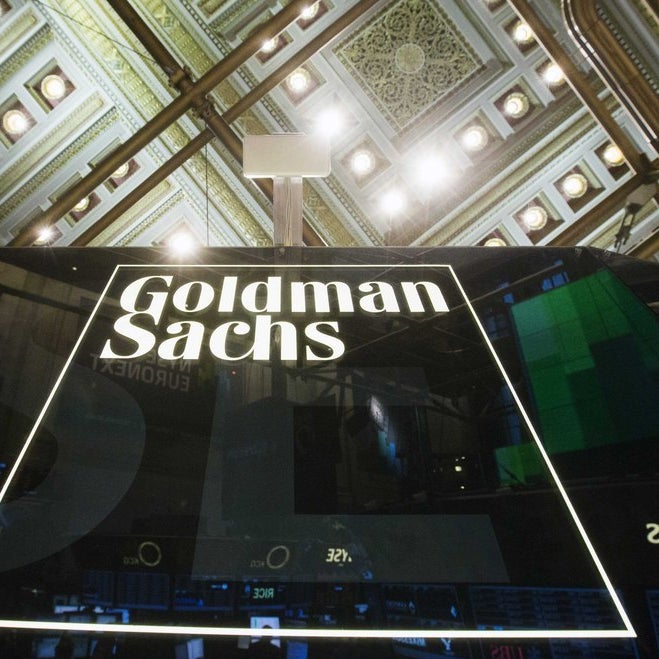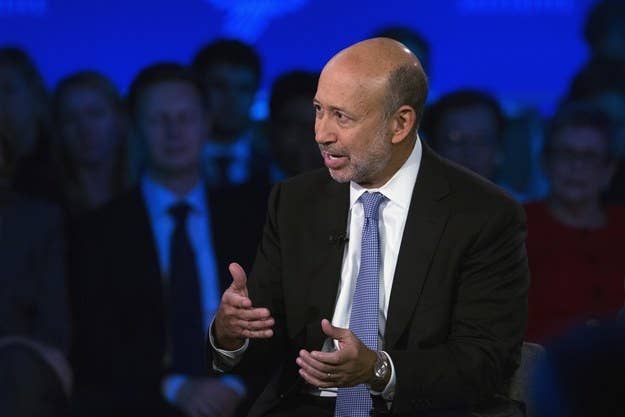

Following a blockbuster report by ProPublica and This American Life alleging that the New York branch of the Federal Reserve, which supervises many of the largest banks, was meek, lackadaisical, and captured by the banks it was supposed to supervise, one of those banks, Goldman Sachs, has changed its policy on employees owning stocks and bonds.
Goldman employees' ownership of other companies' shares has lead to accusations from critics and shareholders of companies working with Goldman Sachs of conflicts of interest.
Investment bankers at Goldman will no longer be able to trade individual stocks or bonds or invest in so-called "event" driven hedge funds — hedge funds that buy up shares of a company speculating that the price will change because of an imminent corporate action like a merger, bankruptcy, or stock sale — or "activist" funds, hedge funds that buy up large stakes of a company and then try to overhaul their operations in order to drive up the stock price. Companies in disputes with activist investors often hire investment banks like Goldman to help advise them.
Before today's policy change, the firm's investment bankers needed company approval before owning individual securities. Bloomberg first reported the changes. A source with knowledge of the policy said bankers would not be forced to sell any existing stocks and bonds and that the policy change had been in discussion for months. The source said the change was intended to address potential conflicts of interest.
The move is part of a series of public and private efforts to improve the bank's reputation with clients and the public following the financial crisis. At a conference last year, the bank's chairman and chief executive officer Lloyd Blankfein said that the firm had decided a few years ago that "we would make our firm better, and put energy into a examination of every behavior we have" and that "there has been a substantial change, some part of it out of the goodness of people's hearts, some of it out of awareness" of the public's perception of the bank.

The ProPublica report and This American Life broadcast, both released this morning, focused on the short career of Carmen Segarra, a former Wall Street lawyer who joined the New York Fed in 2011 and became an in-house examiner of Goldman Sachs. Its based on 46 hours of recordings Segarra surreptitiously made of her interactions with colleagues and bankers. Michael Lewis, the bestselling author of The Big Short and Flash Boys, described the story as the "Ray Rice video of the financial sector."
She almost immediately started clashing with her colleagues and her superiors, finding the Fed lackadaisical, meek, and not willing to aggressively confront the banks it supervised even when they thought they were doing something wrong. She was fired seven months later after a disagreement over whether or not to say in a report that Goldman Sachs did not have a conflict of interest policy, which was a guideline for institutions supervised by the New York Fed.
A Goldman executive told Segarra that the bank did not have a definition of what a conflict of interest was. But her supervisors disagreed over whether Goldman had a conflict of interests policy at all, pointing to a section of their code of conduct that discussed conflicts more generally. Two weeks later, she was fired. The New York Fed said in a statement that Segarra's termination "was based entirely on performance grounds, not because she raised concerns as a member of an examination team about any institution."
Segarra sued the New York Fed and several of its employees last year alleging she had been terminated for revealing a violation of the law and that she was eligible for whistleblower protection. A federal judge threw out the case in April saying that whether or not Goldman had a conflict of interest policy did "not carry with it the force of law." Segarra is appealing the ruling.
In a response to ProPublica, Goldman said it had "long had a comprehensive approach for addressing potential conflicts" and pointed to its Code of Conduct and its Business Standards Report, both of which, the spokesman said, were accessible through "a quick Google search."
Goldman has been particularly bedeviled by accusations of having conflicts of interests and profiting at the expense of its clients.
Carmen Segarra in her time at the New York Fed raised the question about whether or not Goldman had a conflict of interest policy when she was examining the bank following its advisory work for energy company El Paso, which was bought out by the pipeline behemoth Kinder Morgan for $2.1 billion in 2011. Disgruntled El Paso shareholders then sued, arguing they had been shortchanged by Goldman and that the bank could have pushed Kinder Morgan to pay more. Goldman had a substantial stake in Kinder Morgan and a Goldman banker who worked on the deal had a $340,000 stake in Kinder Morgan, meaning the firm's private equity arm and one of its bankers would benefit from Kinder Morgan getting a lower price.
In December 2012, a Delaware judge approved a settlement where Kinder Morgan forked over another $110 million to El Paso shareholders. Kinder Morgan is paid the $110 million to El Paso shareholders and Goldman gave up its $20 million fee. The judge, Leo Strine, said that the deal "should not have gone down how it did."
Goldman also reached one of the largest settlements in the history of the Securities and Exchange Commission over allegations that it had helped arrange a complex security based on bonds constructed out of mortgages. Goldman paid $550 million in the settlement and one of the bankers in the deal, Fabrice Tourre, was held civilly liable for fraud after a trial where Goldman paid his legal bills.
Goldman's private equity arm had a substantial stake in Kinder Morgan, not El Paso.
